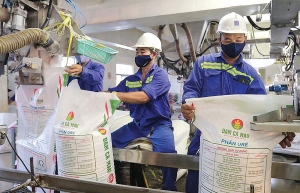VAT rate cut to continue into 2025
Last week, the government issued a resolution following its October cabinet meeting, instructing the Ministry of Finance (MoF) to review, assess, and propose policies aimed at extending exemptions, reductions, and deferrals for a variety of taxes, fees, and land rental payments in 2025. The government emphasised the need to implement these policies as early as possible in the new year to provide timely support.
 |
| VAT rate cut to continue into 2025, photo: freepik.com |
A key component of this directive involves the MoF exploring the extension of maintaining VAT at 8 per cent into the first half of 2025. The ministry is required to report its findings to the ongoing eighth session of the 15th National Assembly (NA).
This review will play a significant role in shaping Vietnam’s fiscal policy as the government seeks to balance support for businesses with broader economic stability.
Deputy Prime Minister and Minister of Finance Ho Duc Phoc has been tasked with overseeing the continued implementation of the extension. The NA is scheduled to issue a resolution on November 30, which is expected to formalise the extension of the VAT reduction policy into 2025.
In June, the NA approved a resolution that kept the VAT rate at 8 per cent until the end of the year. The measure targeted goods and services typically subject to a 10 per cent VAT rate, and was designed to lower costs, encourage production and business activities, and create jobs for workers.
However, several key sectors were excluded from this reduction. These include telecommunications, IT, finance, banking, securities, insurance, real estate, metals, precast metal products, mining (excluding coal), petroleum, chemical products, and goods and services subject to excise tax.
The first VAT reduction was introduced in February-December 2022. Additional reductions were applied in July-December 2023 and again at the end of 2023. The measures reflect the government’s ongoing commitment to supporting businesses during a challenging economic period.
The Ministry of Finance reported that the cumulative value of tax and fee exemptions, reductions, and deferrals in 2023 reached approximately $8.33 billion. This included $3.3 billion in direct exemptions and reductions, and $5.04 billion in payment extensions. In 2022, the total VAT reduction amounted to $1.85 billion, increasing to nearly $2 billion in 2023.
In 2024, the total VAT decrease is estimated to hit $2.04 billion. These figures highlight the significant fiscal support provided by the Vietnamese government to mitigate the impact of economic difficulties on businesses and households.
Despite these measures, Vietnamese businesses continue to grapple with numerous challenges. According to data from the General Statistics Office, over 136,000 new enterprises were established in the first 10 months of this year, with a total registered capital of $54.67 billion. While this demonstrates a degree of resilience, the number of businesses exiting the market has also risen sharply.
During the same period, over 92,000 businesses temporarily ceased operations, representing a 13.6 per cent increase compared to the previous year. Additionally, more than 63,700 enterprises suspended operations while awaiting dissolution, a 25.6 per cent on-year increase. Nearly 17,400 businesses completed dissolution procedures, marking a rise of 20.5 per cent compared to last year. On average, approximately 17,300 businesses exited the market each month, underscoring the difficult operating environment.
The NA Economic Committee highlighted several factors contributing to these difficulties. Domestic purchasing power has shown signs of slowing, while inflationary pressures are increasing in the final months of the year. Furthermore, exports face numerous challenges, including technical barriers, anti-dumping investigations, and dependence on processed products.
The committee also noted that high-tech industries and high-quality services have yet to develop robustly, limiting economic diversification in the country.
Natural disasters have compounded these issues. Typhoon Yagi, for instance, caused significant disruption to production and supply chains in September, leading to delays and temporary business closures. According to estimates, the typhoon may reduce Vietnam’s GDP growth rate for the year by approximately 0.15 per cent.
Amid these challenges, NA deputies have called for stronger and more sustained support for businesses, which they describe as the backbone of the economy.
Tran Thi Quynh, a deputy representing the northern province of Nam Dinh, emphasised the need to extend fiscal support through VAT reductions until at least mid-2025. She also suggested additional assistance for households and enterprises that have been affected by various natural disasters.
“Enterprises are in critical need of state support,” Quynh said. “It is essential to maintain the VAT reduction and loosen fiscal policies to stimulate consumption and economic activity.”
Deputy Nguyen Ngoc Son representing the northern province of Hai Duong, echoed these sentiments, noting the importance of promoting domestic consumption. He called for a clear, long-term roadmap for VAT reductions, suggesting that policies valid for at least a year would provide greater economic stability and more effective demand stimulation.
 | Proposed VAT rule pros and cons for digital products In alignment with the current 10-year socioeconomic development strategy in Vietnam, the draft amended VAT law is currently being developed by the Ministry of Finance, which is seeking input from businesses and business associations to finalise the draft in the near future. |
 | Conclusion nears for VAT fertiliser issue Lawmakers have assessed that if fertilisers were included in the VAT tax group at a rate of 5 per cent, it could create a fairer market but would certainly increase product prices. |
 | Low-value e-commerce goods a target for VAT switch Removal of a VAT exemption on low-value, imported e-commerce products is being suggested to prevent budget losses and keep tabs on the potential impact on local businesses. |
 | Impacts on VAT fertiliser rate rise considered for farmers The National Assembly Standing Committee has fixed a 5 per cent VAT rate on the draft amendments to the existing VAT law, which, if becoming true, will affect millions of farmers in Vietnam while likely benefiting fertiliser producers. |
What the stars mean:
★ Poor ★ ★ Promising ★★★ Good ★★★★ Very good ★★★★★ Exceptional
Related Contents
Latest News
More News
- Raised ties reaffirm strategic trust (February 20, 2026 | 14:06)
- Sustained growth can translate into income gains (February 19, 2026 | 18:55)
- The vision to maintain a stable monetary policy (February 19, 2026 | 08:50)
- Banking sector faces data governance hurdles in AI transition (February 19, 2026 | 08:00)
- AI leading to shift in banking roles (February 18, 2026 | 19:54)
- Digital banking enters season of transformation (February 16, 2026 | 09:00)
- IFC to grant $150 million loan package for VPBank (February 13, 2026 | 09:00)
- Nam A Bank forms position as strategic member at VIFC through three key partnerships (February 12, 2026 | 16:39)
- Banks bolster risk buffers to safeguard asset quality amid credit expansion (February 12, 2026 | 11:00)
- VNPAY and NAPAS deepen cooperation on digital payments (February 11, 2026 | 18:21)

 Tag:
Tag:















 Mobile Version
Mobile Version